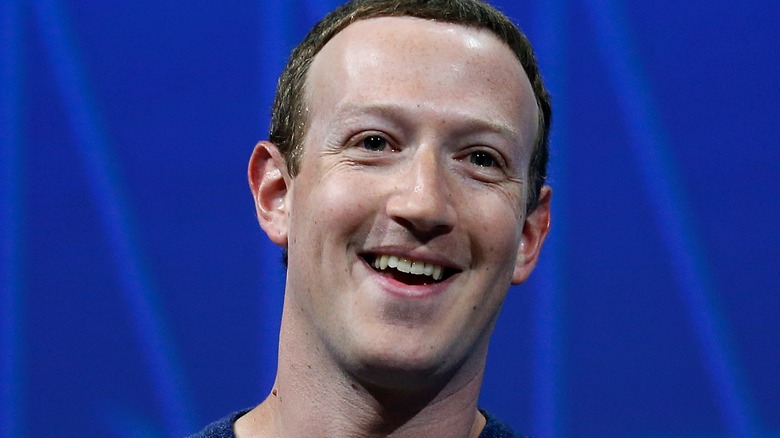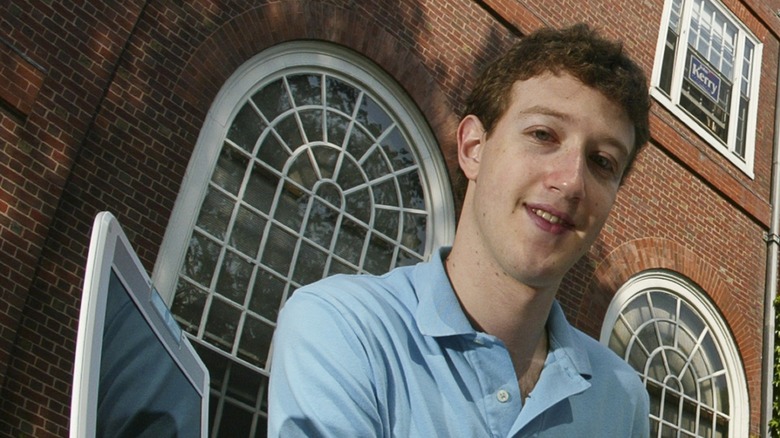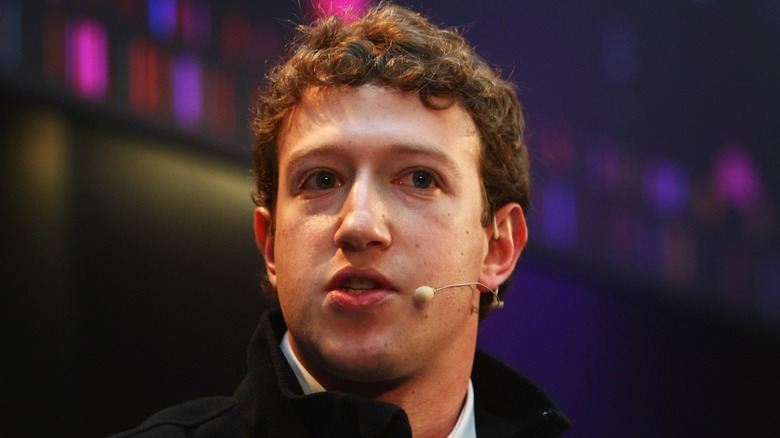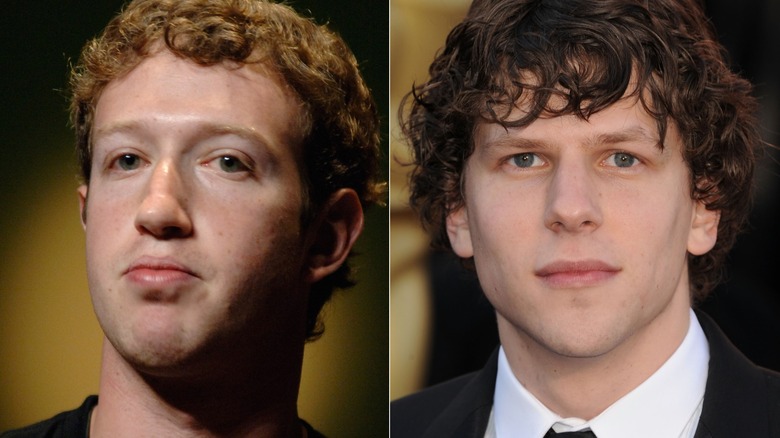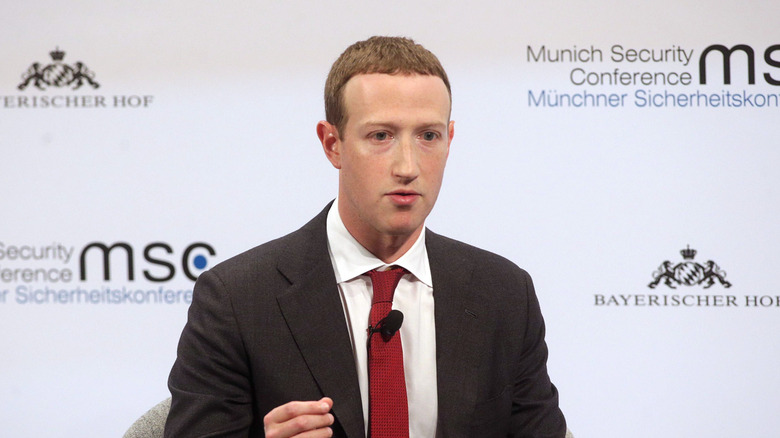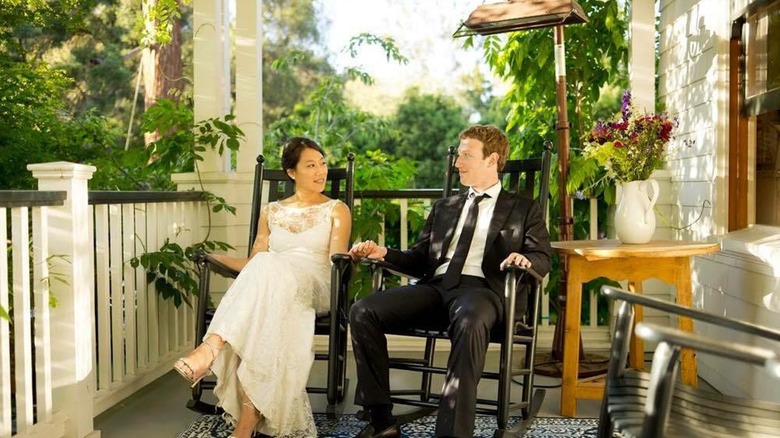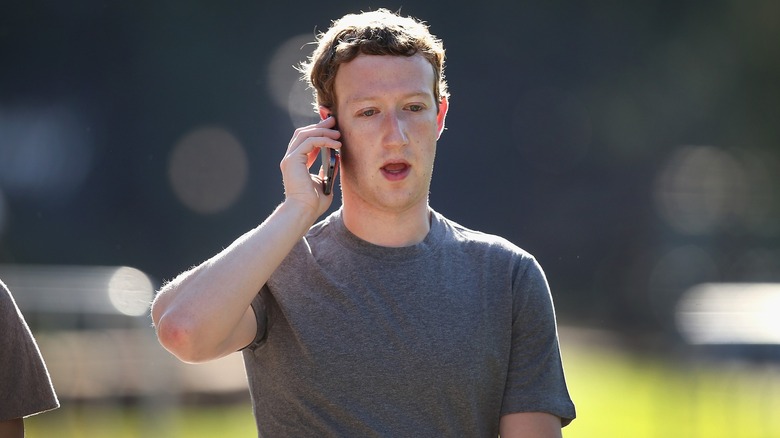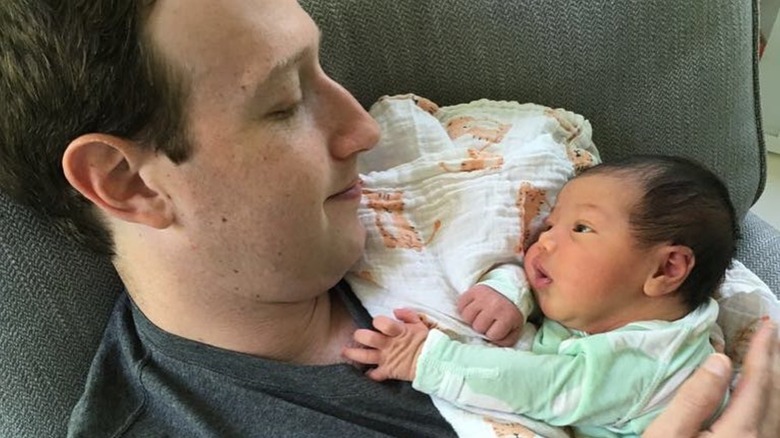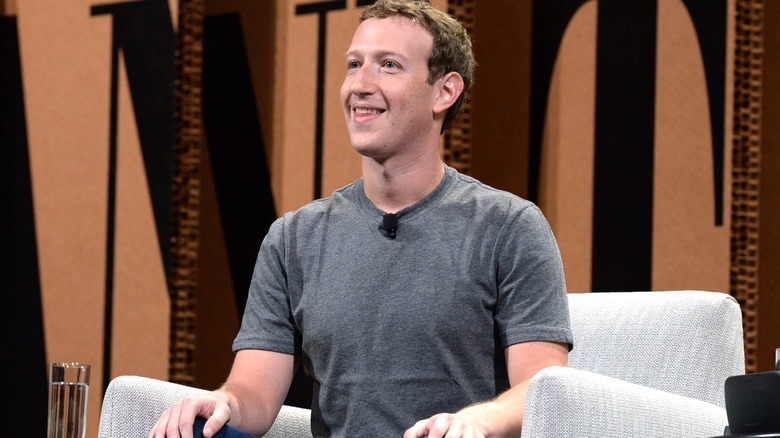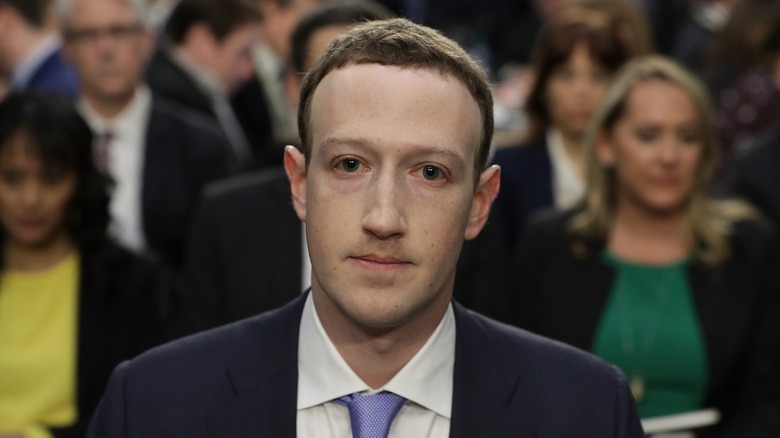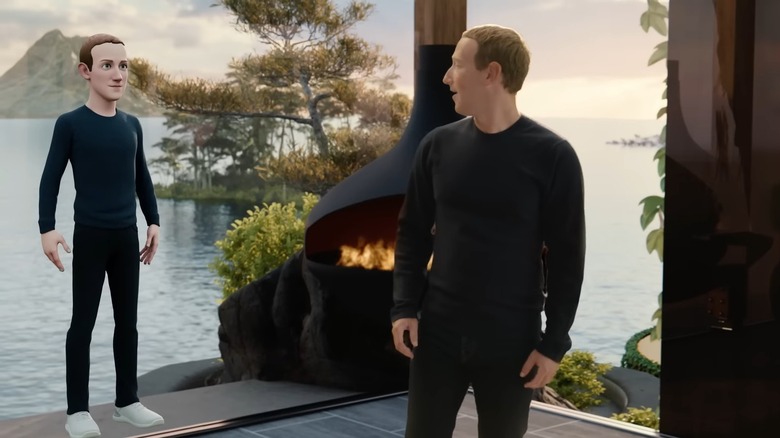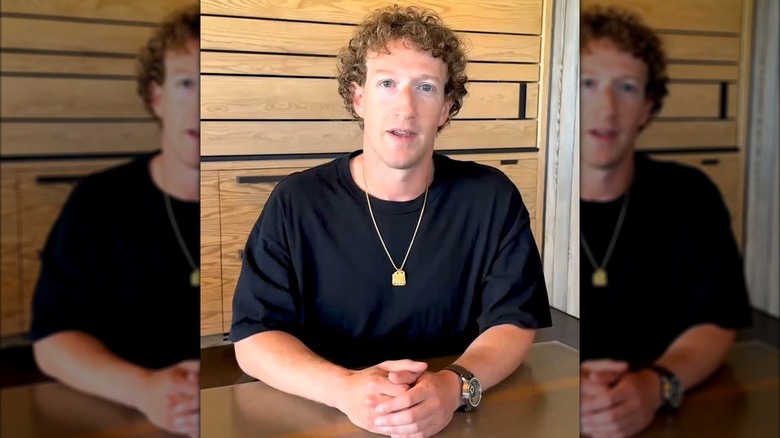Mark Zuckerberg's Complete Transformation
Facebook has changed a lot since the early days. Remember poking each other? Remember writing on each other's walls? Come to think of it, what even was a Facebook wall? Facebook founder Mark Zuckerberg has changed a lot, too. From those early days working on his website in his Harvard dorm to growing a net worth that really is staggering, Zuckerberg's time in the public eye has been one of metamorphosis and reinvention.
He's had to answer for a number of controversies, too, constantly refining what you're allowed to say on his platform as the internet becomes ever more embedded in our lives. "For the last 10 or 15 years, we have gotten mostly glowing and adoring attention from people," Zuckerberg told Vox in 2018, "and if people wanna focus on some real issues for a couple of years, I'm fine with it." His time leading Facebook has meant Zuckerberg has had to navigate being a public figure and a private one, both a family man and a figurehead. This is Mark Zuckerberg's complete transformation.
Mark Zuckerberg became interested in computers as a child
Mark Zuckerberg grew up in New York with three sisters. He was the child of a dentist, and the future Facebook founder found a love of computers very early in his life. On an episode of Reid Hoffman's "Masters of Scale" podcast, Zuckerberg described one of the first computer programs he ever wrote. His father's office was connected to their house, he said, and he realized that his father needed a program that would let him share information. "The dentists and hygienists needed to share data on the patients and chat. So I built a system where he could communicate with folks across rooms, and also communicate with me and my sisters upstairs," Zuckerberg revealed. "And I called it ZuckNet."
Pretty quickly, Zuckerberg's parents realized that they should nurture their son's budding talent. When he was eleven, his parents hired a software developer to come work with him and teach him even more about computers. That tutor later spoke with The New Yorker and recalled, "He was a prodigy. Sometimes it was tough to stay ahead of him."
In high school, Zuckerberg fenced, and he also developed a program called Synapse that would recommend music. The teenager turned down multi-million dollar offers to buy the program, telling The Harvard Crimson, "I don't really like putting a price-tag on the stuff I do. That's just like not the point."
He invented Facebook while at Harvard
At Harvard, the young Mark Zuckerberg continued developing new computer programs. First came "Facemash," a site where Harvard students would be able to rate one another's relative hotness. The site took off immediately among the undergraduate population of the Ivy League school, and school administrators were none too happy. He told The Harvard Crimson, "I put Facemash up on a Sunday night and within four hours my internet connection had been yanked."
Next came a new idea: a digital version of the "facebooks" that schools would publish, a yearbook-style compendium of photos so that students could recognize each other. Zuckerberg decided to put Harvard's facebook online, adding social media capabilities. He called it "Thefacebook.com." "I'm going on the theory that like, I'm in college just like everyone else, so stuff that's applicable to me is probably applicable and useful to everyone else, as well," he told The Crimson. Thefacebook.com took off even more than Facemash had, rolling out to college campuses across the country all while Zuckerberg was still a teenager.
The tech press soon came calling. In 2004, when he was still 19, Zuckerberg spoke with CNBC about his invention. "We're going to launch a bunch of side applications, which should keep people coming back to the site, and maybe we can make something cool," he said. "Who knows where we're going next?"
Mark Zuckerberg was sued for stealing the idea for Facebook
In 2004, the same year Facebook launched, Mark Zuckerberg was sued by three former classmates. Alongside twin brothers named Tyler and Cameron Winklevoss, Divya Narendra claimed that Zuckerberg stole the idea for a campus-based social network from them; they alleged that he created Facebook while knowing full well that they were working on launching something called ConnectU. As evidence, they pointed to an email Zuckerberg allegedly wrote before either site launched, warning someone working on Facebook that they needed to get online first. "If we don't make a move soon, I think we will lose the advantage we would have if we release before them," he wrote (via Reuters).
The case took several years to work its way through the system. In 2009, The Guardian reported that Facebook had paid $65 million to settle the lawsuit. In an interview with the Recorder (via The Guardian), intellectual property lawyer Chris Scott Graham said, "$65 million is a significant sum — it's certainly more than the cost of the defense." Nevertheless, he said, "It's a very small percentage of [Facebook's] valuation." Zuckerberg's invention had gone global, and the money had followed.
A biopic about Mark Zuckerberg was an awards-season darling
In 2010, director David Fincher released "The Social Network," a film about the drama behind the invention of Facebook. It starred Jesse Eisenberg as the college-aged Mark Zuckerberg, portraying all of the intrigue and scandal that went into the world's biggest social network site. "The Social Network" made Zuckerberg seem like an annoying guy, difficult to get along with and hard to understand; he seemed like the kind of person who would cut his friends off in pursuit of power.
Zuckerberg, perhaps understandably, wasn't a fan of the way the movie made him look. "They just kind of made up a bunch of stuff that I found kind of hurtful," he said years later (via The Verge), taking issue with the idea that he made Facebook to get girls.
Nevertheless, the film was a hit, racking up awards. At the Golden Globes, screenwriter Aaron Sorkin attempted to placate Zuckerberg. "Mark Zuckerberg, if you're watching tonight," he said (via TIME), "... you turned out to be a great entrepreneur, a visionary and an altruist." Years later, on the other side of many scandals, Sorkin would take it back in a New York Times op-ed. "I didn't push back on your public accusation that the movie was a lie because I'd had my say in the theaters," he wrote, "but you and I both know that the screenplay was vetted to within an inch of its life by a team of studio lawyers..."
He was named TIME's Person of the Year in 2010
In 2010, the same year as the release of "The Social Network," Mark Zuckerberg was on top of the world. At least, that's what TIME decided when they named him Person of the Year. "In less than seven years, Zuckerberg wired together a twelfth of humanity into a single network, thereby creating a social entity almost twice as large as the U.S.," Lev Grossman wrote in the article announcing the honor. In less than a decade, in other words, Zuckerberg had transformed from an awkward college student to the leader of one of the most influential companies in human history.
To that end, TIME asked Zuckerberg to confront the fact that his website was collecting a significant amount of data about its users. The magazine noted that the company's dataset had the potential to affect the way countries are run, and Zuckerberg said the company refuses to comply with such requests. "Oftentimes someone will come with a subpoena, and we'll go to court and say, 'We don't think this is enough,'" he insisted. "Ultimately I think this stuff gets used for good." In just a few short years, Zuckerberg would find himself called in front of Congress to discuss the political ramifications of Facebook. In 2010, though, he was flying high.
Mark Zuckerberg married Priscilla Chan in 2012
In "The Social Network," Mark Zuckerberg (as played by Jesse Eisenberg) had significant trouble with women. In real life, however, Zuckerberg had been in a relationship with Priscilla Chan since before he founded Facebook. The truth about Priscilla Chan is that she met Zuckerberg at a fraternity party while at Harvard, and they stayed together all throughout his skyrocketing fame and success.
The couple married in 2012, tying the knot the day after Facebook went public. The wedding took place in their own backyard, and it attracted such illustrious guests as Green Day front man Billie Joe Armstrong, who performed for the couple. The New York Times spoke with friends of Chan, looking into who exactly was the woman behind one of Silicon Valley's most famous men, and they found a woman who wasn't interested in the spotlight. "Priscilla doesn't need to be on the cover of a magazine. We are in a reality-star ecosystem," venture capitalist Heidi Roizen said. "But there is a spectrum to this stuff, and some people take a more thoughtful approach."
In 2015, Mark Zuckerberg's charitable donations to Newark came under fire
Pretty quickly, as Mark Zuckerberg amassed a massive wealth — even as he told reporters that it wasn't about the money — he realized that he needed to give some of it away. In 2010, he announced an initiative to help overhaul schools in Newark, New Jersey. He gave $100 million to support education there, and by 2015, it had all fallen apart.
Journalist Dale Russakoff told NPR that Zuckerberg's initiative included expanding the availability of charter schools, which also meant reorganizing districts and closing down existing schools. The algorithm that assigned students to schools didn't take safety into account, Russakoff said, especially in a city where many kids walked to school instead of taking busses. "When a school is closed, children had to walk through very dangerous territory, you know, sometimes through gang territory, through drug dealing neighborhoods. And none of that was kind of vetted in advance to see what can we do for these kids to make sure they're safe?"
Russakoff wrote a book called "The Prize," which looked into the failed initiative, and he spoke with the Facebook CEO about the situation. "Mark Zuckerberg's intent was to go to more and more cities with this model and use his philanthropy to basically solve the urban education crisis," Russakoff told NPR. "He's not trying to do that anymore..."
Mark Zuckerberg became a father
In 2015, Mark Zuckerberg added something new to his list of accomplishments: he became a father. His first daughter was named Max, and he announced her arrival in a post on (where else?) Facebook. The post included an open letter to Max, describing her parents' wishes for her life. "Your mother and I don't yet have the words to describe the hope you give us for the future. Your new life is full of promise, and we hope you will be happy and healthy so you can explore it fully. You've already given us a reason to reflect on the world we hope you live in," he wrote.
Two more children followed. Their daughter August got her own open letter on Facebook in 2017, where Zuckerberg wrote, "Welcome to the world! Your mom and I are so excited to see who you will become." A third daughter, this one named Aurelia, arrived in 2023. She made her debut on Instagram instead, in a post reading, "Welcome to the world, Aurelia Chan Zuckerberg! You're such a little blessing."
In a joint appearance on CBS This Morning, Zuckerberg and Priscilla Chan insisted that they were trying to raise their daughters as normally as possible. "We don't give them everything," Zuckerberg said. Chan chimed in, "They have chores; they have responsibilities."
He pledged to donate 99% of his wealth from his Facebook shares
In the open letter that announced the arrival of his first daughter, Mark Zuckerberg and Priscilla Chan also announced a new philanthropic endeavor that would supposedly see them give away 99% of their Facebook shares over the course of their lifetimes. "We believe all lives have equal value, and that includes the many more people who will live in future generations than live today," Zuckerberg wrote. "Our society has an obligation to invest now to improve the lives of all those coming into this world, not just those already here."
Law professor Joel Fleishman told The Guardian that Zuckerberg's philanthropy may have a positive effect on other super-rich people. "People who've made all that money are by nature competitive; someone that young giving away that much money will undoubtedly stimulate others to do likewise," he said.
The Zuckerberg Chan Initiative continues today. In a 2019 interview with CBS News, Zuckerberg committed to working on healthcare. "We do think that it will be possible to cure, prevent, or be able to manage all diseases by the end of this century," he said. His wife chimed in, adding, "Setting audacious goals is important, and we need to think about beyond what's possible."
Mark Zuckerberg defended his company from accusations of democracy-tampering
In 2018, the sunny optimism that powered Facebook's early years had soured. A company called Cambridge Analytica used the user data collected by Facebook to mount massive influence campaigns, including the Brexit vote and the 2016 United States presidential election. The scandal grew so large, in fact, that Mark Zuckerberg was called to testify before Congress. He insisted that Facebook would be looking into how this happened. "[Facebook will be] investigating many apps, tens of thousands of apps, and if we find any suspicious activity, we're going to conduct a full audit of those apps to understand how they're using their data and if they're doing anything improper," he said (via the New York Times). "If we find that they're doing anything improper, we'll ban them from Facebook and we will tell everyone affected."
Zuckerberg reckoned with his own personal complicity in a Vox interview. He confessed to having dropped the ball, admitting, "We were too focused on just the positives and not focused enough on some of the negatives... a lot of people are using [Facebook] for a lot of good, but we also have a responsibility to mitigate the darker things that people are gonna try to do."
Mark Zuckerberg's surfing adventures went viral
After Facebook's public image took a major hit, Mark Zuckerberg seemed to try to clean up his own persona. In 2020, while the world was locked down due to the COVID-19 pandemic, photos of Zuckerberg surfing went mega-viral online. He'd slathered his face in sunscreen, giving him a shocking appearance that many social media users online found hilarious. He addressed the virality the next year in an Instagram Live chat (via Buzzfeed), joking, "If someone wants to post a sunscreen meme, it's cool. I'm happy to give the internet some laughs."
It worked well for him, so Zuckerberg continued to surf publicly. On July 4th, 2024, he posted an Instagram video of himself once again on a surfboard, this time drinking a beer and carrying a giant American flag. "Happy birthday, America!" he wrote alongside an American flag emoji. In his comments, followers noted the tech CEO's new look. "Bro was sick of the lizard allegations," one person wrote, "so he got a glow up."
In 2021, he introduced the world to his virtual alter ego
In 2021, Facebook went through its biggest transformation yet. That year, the company was reorganized as Meta (to a name change that had Alexandria Ocasio-Cortez fuming), with Mark Zuckerberg still on top. The new name reflected a move into what Zuckerberg called "The Metaverse," a virtual reality environment that he insisted would be the technology of the future. To debut The Metaverse, Zuckerberg showed off a computer-generated alter ego, a virtual avatar that matched his close-cropped hair, tight black shirt, and black pants. "In this future, you will be able to teleport instantly as a hologram to be at the office without a commute, at a concert with friends, or in your parents' living room to catch up," he wrote in an open letter to his company.
Zuckerberg's Meta avatar went through several transformations over the next few years, various demonstrations depicting the Metaverse Zuckerberg in various ways. In 2022, he excitedly introduced legs to the Metaverse, telling everyone (via Forbes), "...legs are hard, which is why other virtual reality systems don't have them either." Sure, the demo was ultimately revealed to have been staged, but who's counting?
Mark Zuckerberg debuted his tech-bro look as he announced Meta's new discrimination policy
In early 2025, as Donald Trump began the second term of his presidency, Meta shifted once again. Mark Zuckerberg had publicly wrestled with Facebook's responsibility to fact-check posts, and in 2025, Zuckerberg announced that his company would be relaxing its policies, even inviting discrimination against certain groups without penalty. In a video posted to Facebook, he announced, "We're gonna simplify our content policies and get rid of a bunch of restrictions on topics like immigration and gender that are just out of touch with mainstream discourse." Can we bring back poking instead?
In addition to the company's new policy, Zuckerberg's curly-haired tech-bro look made headlines; he'd taken to wearing only baggy black t-shirts paired with a long gold chain. He'd even packed on some muscle in recent years, posting proudly about getting into jujitsu (he can even be counted among Elon Musk's messiest feuds, almost coming to blows with his fellow tech bro). A longtime friend told the New York Times, "I don't think he's doing it for looks. I think he's doing it because he's really into jujitsu."
